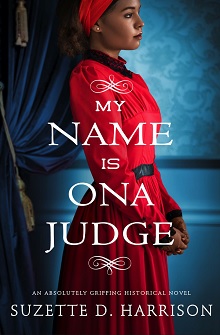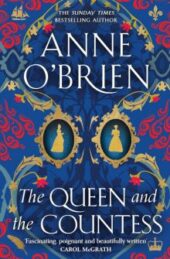Suzette D. Harrison uses her fiction to re-write the stories we think we know about history, and My Name is Ona Judge is no exception. This is Suzette D. Harrison’s twelfth book, and is based on the true story of one of George and Martha Washington’s slaves: Ona Judge Staines. Contradicting the historical whitewashing that has occurred in the writing of the history of the ‘founding’ of America, Harrison refuses to contribute to the erasure of facts concerning George Washington’s status as both America’s first President and a slave master. This book seeks to highlight African-American experiences of 18th century America, and explores Ona’s experiences of community, bondage, the hierarchy of a human chattel system, and the legacy of slavery in the lives of her descendants.
My Name is Ona Judge is a dual-timeline fiction following two female protagonists: Ona and Tessa. In present day Chincoteague, Virginia, interior designer Tessa proves that ‘every house has a story and a spirit’ after discovering Ona’s diary in her family friends’ ancestral home. Taking this diary away with her to read, Tessa delves into the life of a figure lost to history, finding comfort in Ona’s strength and a connection to a past that many thought had been lost forever. Harrison cleverly intertwines Tessa’s discoveries with Ona’s own accounts: Ona’s timeline follows her throughout her childhood, from being gifted as a playmate to Martha Washington’s granddaughter at the age of ten, to her promotion to Martha Washington’s personal maid, her move to New York, and her eventual escape from the Washington household and ownership. Living a life where ‘time was not mine, but devoted to another’s benefit’ and where she was valued at just ten dollars, Ona’s strength and determination to reclaim her future is an inspiration to all, but particularly to Tessa, who must face her own future and decide whether to take ownership over her life and love.
Harrison tackles important and heart-breaking issues surrounding slavery, as well as racial issues that continue to this day: she places emphasis on the hierarchy of colour and complexion, the power of a person’s name, and acknowledges that American-American stories of the past are frequently limited to oral histories. Harrison cleverly reflects this emphasis on non-verbal forms of historical inheritance within this novel, by creating a beautiful dialogue surrounding sewing: Ona is taught to sew and embroider by her mother, and subsequently passes this skill on to other members of her community and family. Harrison similarly uses water as another non-verbal form of history, facilitating the connection of African-American experiences throughout history. Ona recalls her mother’s belief that ‘rivers and oceans are magical for folks who were stolen and brought over on them’, whilst many of Tessa’s transformation life moments, particularly regarding her journey to reclaiming her life and escaping a controlling boyfriend, occurs in the rain or around water.
My Name is Ona Judge is both a heart-breaking and heart-warming tale of love, loss, bravery and determination, which helps to rewrite the history of 18th century America.
Ella Beales is a Historical Researcher, Assistant Archivist and Public Historian.






